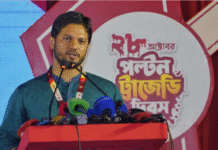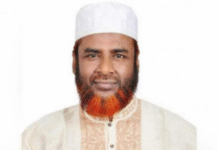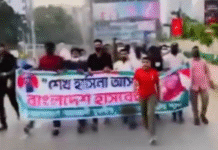Judges at the International Crimes Tribunal-2 found Jamaat-e-Islami leader Mohammad Kamaruzzaman– who was indicted in seven charges including murder, mass murder and rape–guilty of five charges on Thursday.
The International Crimes Tribunal (ICT) has said the defence failed to annul prosecution’s charge that Jamaat-e-Islami leader Mohammad Kamaruzzaman had mobilised the Al-Badr in the greater Mymensingh area during the 1971 Liberation War.
Judge Md Mozibur Rahman said five of the seven charges levelled against him had been proven.
Rahman read out the summary verdict on the Jamaat leader on Thursday.
He said, according to the charges brought by the prosecution, Kamaruzzaman was the ‘chief organiser’ of the Al-Badr, a militant outfit formed to assist the Pakistan army to thwart Bangladesh’s freedom struggle in 1971, of greater Mymensingh region.
Kamaruzzaman was sentenced to death on charges of genocide at Shohagpur and murder of Golam Mostafa, Justice Obaidul Hassan said as he read out the verdict. “Seeing how he has committed these crimes, it will not be fair if he is not penalised with capital punishment.”
The Jamaat leader was given life in prison for killing Badiuzzaman and the murder of five. Ten years of imprisonment has been given out for torturing Lecturer Syed Abdul Hannan.
The ruling observed that it was only the Jamaat-e-Islami which formed Al Badr, Al Shams and several other armed organisations to commit crimes against humanity across the country in 1971.
Upon hearing the verdict, Kamaruzzaman stood up and said, “Wrong judgement. Everyone has to stand in the court of history.”
In an instant reaction to the verdict, Kamaruzzaman’s lawyer Abdur Razzaq told bdnews24.com, “We will appeal.”
However, tribunal’s prosecution and Attorney General Mahbubey Alam expressed satisfaction over the verdict.
People waiting outside the court premises, at Shahbagh’s Ganajagaran Mancha and several other parts of the country came down to the streets apparently expressing satisfaction over the verdict.
The prosecution had presented a report run by the Jamaat mouthpiece Daily Sangram during the war to support its allegation.
Judge Rahman said the defence had failed to prove otherwise.
Charges of Genocide at Sohagpur, torture of lecturer Abdul Hannan, muder of Golam MOstafa, and the murder of five were proved.
The verdict said that the charges of killing eight against Kamruzzaman could not be proved beyond doubt.
Kamaruzzaman was brought to the courtroom at 11:45am. Five minutes later the judges arrived.
Chairman of the International Crimes Tribunal-2, Justice Obaidul Hassan, thanked the lawyers of both prosecution and defence, and began reading out the details of Kamaruzzaman’s case.
Justice Mohammad Shahinur Islam began reading the 62-page summary of the 215-page verdict at 11:21am in an overcrowded courtroom, bdnews24.com Correspondent reported.
Justice Mohammad Mojibur Rahman Mia will read out the second part of the verdict with the Chairman giving the final verdict.
Kamaruzzaman was clad in a white shirt and black trousers. When brought, he headed straight to the place designated for him without looking anywhere. His oiled hair was brushed neatly, and was not wearing a cap.
Freedom Fighters, eminent personalities and leaders of Ghatak Dalal Nirmul Committee were seen at the International Crimes Tribunal (ICT) premises despite a drizzle on Thursday morning, awaiting the verdict of Jamaat-e-Islami leader Mohammad Kamaruzzaman.
The three-member judge panel of ICT arrived at the court premises at around 10:00am.
Media, lawyers, and many others from various walks of life were gathering at the tribunal premises since morning, bdnews24.com Correspondents at scene reported. Jamaat’s Assistant Secretary General Kamaruzzaman was brought to the tribunal from Dhaka Central Jail at around 9:30am.
Ghatak Dlal Nirmul Committee chief Shahriar Kabir, Professor Muntasir Mamun, Sammilita Sangskritik Jote President Nasiruddin Yousuf Bachchu were present at scene and were talking to journalists. They were all hoping for capital punishment for Kamaruzzaman and all war criminals.
Muktijoddha Sangsad Central Command Council members arrived at tribunal premises with national flags and their own flags at around 10:45am. Council Chairman Retired Major General Helal Morshed Khan was seen leading them.
They were chanting slogans demanding execution of war criminals.
Special security arrangements were made at the tribunal premises, Ramna zone police Assistant Commissioner (patrol) Imanul Islam told bdnews24.com. Traffic has been curbed through Doyel Chattar, Kadam fountain and other areas.
Police and Rapid Action Battalion (RAB) were seen alert outside the tribunal premises.
ICT-2 started hearing Kamaruzzaman’s case on Jun 4 last year. The Jamaat leader has been charged on seven accounts of crimes against humanity during the Liberation War of Bangladesh in 1971.
The prosecution accused Kamaruzzaman, who then was the head of the Mymensingh unit of Jamaat’s student affiliate Islami Chhatra Shangha, of setting up the Al Badr collaborator force with handpicked activists in Jamalpur on Apr 22.
The force was accused of involvement in genocide, killing, rape, looting, arson, and deportation of people in the greater Mymensingh district including Jamalpur, Netrokona, Kishoreganj, Sherpur and Tangail, the prosecution said.
THE SEVEN CHARGES BROUGHT AGAINST KAMARUZZAMAN
Killing of Badiuzzaman
Led by Kamaruzzaman, the Al-Badr captured Badiuzzaman, son of Fazlul Haque of Kalinagar at Nalitabari in Sherpur, from Ramnagar on Jun 29. Later, he was tortured and shot dead on the road at Ahammadnagar village and his body was dumped in the river.
Torture of Lecturer Abdul Hannan
Kamaruzzaman and his associates captured the then Lecturer of Islamic History at Sherpur College Syed Abdul Hannan in one afternoon of May in 1971. His head was shaved, his body and face were coloured with ink and lime, and then he was made to walk down the street of Sherpur town while being whipped naked.
Genocide at Shohaghpur
On July 25, 1971, planned and advised by Kamaruzzaman, the Pakistan Army, aided by Al-Badr and Razakar, surrounded Shohagpur village at Nalitabari in Sherpur and killed 120 men and raped women of the village.
Murder of Golam Mostafa
The Al-Badr captured Golam Mostafa on Aug 23, 1971 and kept him confined to the force’s camp on Kamaruzzaman’s orders. Mostafa’s uncle Tofael Islam had requested Kamaruzzaman to set free his nephew. But the Al-Badr took Mostafa and another man named Abul Kashem to the Sherry Bridge in the area.
Mostafa was killed, but Kashem survived by jumping into a river after being shot in the hand.
Killing of eight
Members of the Al-Badr captured Liakat Ali and 11 others from Chawkbazar at Sherpur in the middle of the Ramadan during the war. All but three were shot dead in presence of Kamaruzzaman.
Repression of Didar and others
The Al-Badr picked up one Didar and several others and took them to the Mymensingh district bungalow in November 1971. They were tortured until they agreed to speak in favour of Pakistan.
Murder of five
The Al-Badr members had surrounded the house of Tepa Miah on the 27th day of Ramadan and killed his son and four others following the orders of Kamaruzzaman.
Source: Bd news24










